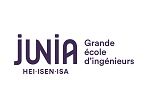Establishment
Language of instruction
French, English
Teaching content
MT-IT
Training officer(s)
D.DELANNOY
Stakeholder(s)
B. Van Moerkercke (Euro Information), P. Mariage (Université Catholique de Lille)
Présentation
Prerequisite
None
Goal
Targeted skills : 31(311/312/313), 32(321/322/323), 33(331/332/333), 56(561/562), 71(711), 110(1102)
In connection with technical and management, this module allows to understand the stakes and to master the deployment of the new information technologies.
The agility that determines responsiveness to evolutions applies not only to software development, but also to the way in which the businesses and functions of the company rely on a harmonious set of resources - hardware, software, personnel, data and Procedures.
The construction of an information system can no longer be freed from urbanization without compromising its ability to integrate new needs as a city could fade due to the lack of adequate infrastructures.
The aim is to provide a complementary managerial dimension to the technical training required for architectural missions.
The orientation is suitable for the engineering profiles of the areas of software development, big data, cyber security and connected objects, part of project management allows to integrate managerial profiles.
At the end of the course, the student will:
- Understand the challenges of an information system
- Be able to identify the architecture of an information system (from hardware to applications)
- Know how to follow a method of analysis of the computer heritage
- Be able to identify, analyze and classify the axes of improvement of an information system
- Know how to design an evolution plan
- Know how to follow urbanization methods and good practices
In connection with technical and management, this module allows to understand the stakes and to master the deployment of the new information technologies.
The agility that determines responsiveness to evolutions applies not only to software development, but also to the way in which the businesses and functions of the company rely on a harmonious set of resources - hardware, software, personnel, data and Procedures.
The construction of an information system can no longer be freed from urbanization without compromising its ability to integrate new needs as a city could fade due to the lack of adequate infrastructures.
The aim is to provide a complementary managerial dimension to the technical training required for architectural missions.
The orientation is suitable for the engineering profiles of the areas of software development, big data, cyber security and connected objects, part of project management allows to integrate managerial profiles.
At the end of the course, the student will:
- Understand the challenges of an information system
- Be able to identify the architecture of an information system (from hardware to applications)
- Know how to follow a method of analysis of the computer heritage
- Be able to identify, analyze and classify the axes of improvement of an information system
- Know how to design an evolution plan
- Know how to follow urbanization methods and good practices
Presentation
Such as urbanization of human habitat (organization of cities, territory), its concepts have been taken up in computer science to model and formalize the engineering of Information Systems (IS). Urban planning thus defines rules and a coherent, stable and modular framework, to which the various stakeholders refer for any investment and evolution decision relating to the Information System.
An introduction to the use of "best practices" ITIL (Information Technology Infrastructure Library) presents the methods and tools that today are indispensable for improving the management of IT services. It brings together the means to structure and improve the efficiency, performance and costs of these services. The adoption of these good practices ensures that customers and suppliers (internal and external) have a service that meets internationally established quality criteria.
This module covers the following topics:
- The role and the stakes of an information system
- The foundations and principles of urbanization
- The strategic changes in the company
- The market opportunities
- The role of the players in the information system
- The mapping tools and metamodel representation
- The definition of the different missions of urbanization
An introduction to the use of "best practices" ITIL (Information Technology Infrastructure Library) presents the methods and tools that today are indispensable for improving the management of IT services. It brings together the means to structure and improve the efficiency, performance and costs of these services. The adoption of these good practices ensures that customers and suppliers (internal and external) have a service that meets internationally established quality criteria.
This module covers the following topics:
- The role and the stakes of an information system
- The foundations and principles of urbanization
- The strategic changes in the company
- The market opportunities
- The role of the players in the information system
- The mapping tools and metamodel representation
- The definition of the different missions of urbanization
Modalités
Organization
| Type | Amount of time | Comment | |
|---|---|---|---|
| Face to face | |||
| Lectures - face to face | 10,00 | ||
| Mini-project | 10,00 | ||
| Independent study | |||
| Independent study | 15,00 | ||
| Overall student workload | 35,00 | ||
Evaluation






